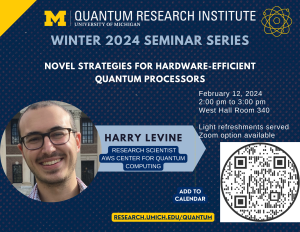Presented By: Quantum Research Institute
Quantum Research Institute Seminar | Novel strategies for hardware-efficient quantum processors
Harry Levine, AWS Center for Quantum Computing of Physics

Dr. Harry Levine, Research Scientist at the AWS Center for Quantum Computing of Physics, will be presenting "Novel strategies for hardware-efficient quantum processors" as part of the Quantum Research Institute's winter seminar series on February 12th, from 2 pm - 3 pm in West Hall, Room 340 (3rd floor). A Zoom option is also provided.
Seminar Description:
Quantum error correction is an exciting scientific frontier at the interface of many fields including quantum information science, many-body physics, and computer science. The field has developed rapidly in the last several years, with major milestones marking the first glimpses into a future of error-corrected quantum computers. At the same time, these advances have also illuminated the major science and engineering challenges that remain on the road to useful fault-tolerant quantum computers due to large resource overheads and demanding performance and control requirements. In this talk, I will discuss recent progress in strategies to ease the demands of error correction with a focus on two leading quantum information platforms: superconducting circuits and cold atoms. First, I will discuss the paradigm of “erasure qubits” which are qubits for which errors can be flagged in real-time and are consequently easier to correct. In this context, I will discuss recent experiments showing how erasure qubits can be realized using a “dual-rail” encoding in superconducting transmons, offering a way to package standard qubit components into better error correction building blocks. Second, I will discuss the recent, rapid progress in neutral atom quantum computers and highlight how the unique capabilities for efficient and flexible control can ease the path towards scalable operation of error-corrected quantum processors.
Seminar Description:
Quantum error correction is an exciting scientific frontier at the interface of many fields including quantum information science, many-body physics, and computer science. The field has developed rapidly in the last several years, with major milestones marking the first glimpses into a future of error-corrected quantum computers. At the same time, these advances have also illuminated the major science and engineering challenges that remain on the road to useful fault-tolerant quantum computers due to large resource overheads and demanding performance and control requirements. In this talk, I will discuss recent progress in strategies to ease the demands of error correction with a focus on two leading quantum information platforms: superconducting circuits and cold atoms. First, I will discuss the paradigm of “erasure qubits” which are qubits for which errors can be flagged in real-time and are consequently easier to correct. In this context, I will discuss recent experiments showing how erasure qubits can be realized using a “dual-rail” encoding in superconducting transmons, offering a way to package standard qubit components into better error correction building blocks. Second, I will discuss the recent, rapid progress in neutral atom quantum computers and highlight how the unique capabilities for efficient and flexible control can ease the path towards scalable operation of error-corrected quantum processors.